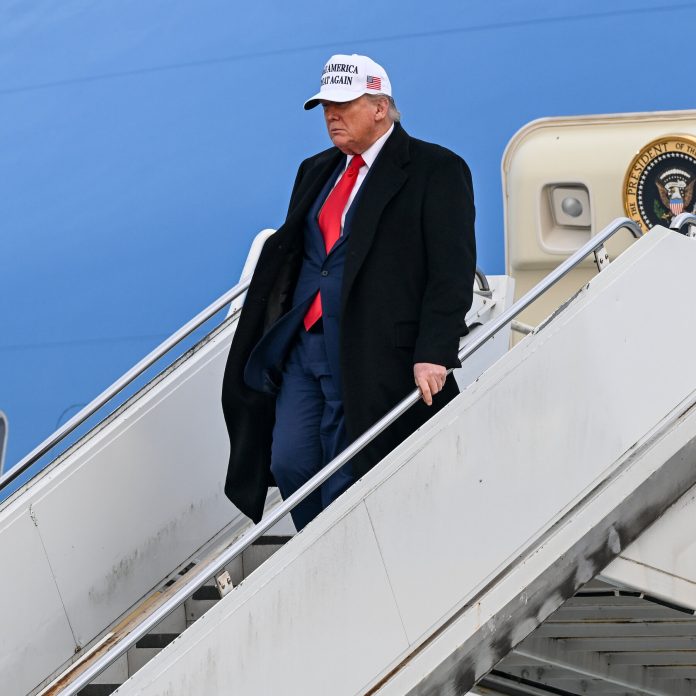President Trump’s response to the escalating conflict between Israel and Iran has been anything but consistent—swinging from full support of Israel’s military actions to distancing himself from them, only to shift again. His unpredictability, underscored by his early departure from the G7 summit in Canada, has added to global uncertainty. When asked about leaving, Trump vaguely cited “big stuff” awaiting him in Washington. The White House attributed it to developments in the Middle East, though Trump later claimed on Truth Social that it had “nothing to do with a Cease Fire.”
Israeli Prime Minister Benjamin Netanyahu asserted that Israel’s strikes were “fully coordinated” with the U.S., but Trump’s conflicting messages have raised questions: What is guiding his thinking—and what are his options?
1. Escalate Under Netanyahu’s Pressure
As Israeli missiles struck Tehran, Trump issued a warning to Iran’s leadership, threatening even more severe attacks via America’s close ally, Israel. Like Netanyahu, Trump has declared that Iran must never obtain a nuclear weapon. However, Trump has long presented himself as a dealmaker, suggesting he prefers a diplomatic solution, unlike Netanyahu’s militaristic stance.
Still, Trump has wavered on how to reach that goal. One moment he leans on diplomacy; the next, he hints at brute force. He recently suggested that an Israeli strike might either help secure a deal—or “blow it.” Supporters have framed his erratic approach as intentional, invoking the “madman theory” of foreign policy—an idea once associated with President Nixon, where unpredictability is used as a negotiation tactic.
Some of Trump’s allies believe that “maximum pressure” will force Iran to the table, despite the fact that Iran had already been engaged in negotiations, with a sixth round of talks scheduled in Oman—talks now canceled. Meanwhile, Netanyahu continues to lobby for military escalation, potentially pushing Trump to make good on his threats. Behind the scenes, Israel is pressuring the U.S. to help eliminate Iran’s underground enrichment site at Fordow using American bunker-buster bombs.
Trump also faces rising pressure from hawkish Republicans in Congress who have long advocated for regime change in Iran. While some may argue that escalating would weaken Iran’s negotiating position, the reality is Iran was already at the table.
2. Maintain a Middle Path
So far, Trump has maintained that the U.S. is not directly involved in Israel’s offensive. Yet, American warships and missile systems are actively helping defend against Iranian retaliation, suggesting deeper involvement than he admits.
Escalation could carry legacy-defining risks for Trump. Advisors from the National Security Council are reportedly urging restraint, especially in light of recent Iranian missile strikes that penetrated Israeli and U.S. defenses with deadly effect.
Netanyahu has floated the idea of targeting Iran’s Supreme Leader, Ayatollah Khamenei, claiming it would end the conflict. But U.S. officials, speaking anonymously, say Trump has rejected such an escalation—for now.
3. Listen to MAGA Voices and Pull Back
Trump’s decision-making is also heavily influenced by domestic politics, particularly voices within his MAGA base. While most Republican lawmakers continue to strongly back Israel, some influential MAGA figures are breaking ranks.
Prominent pro-Trump commentator Tucker Carlson recently criticized the administration for misleading the public about U.S. involvement, calling on America to “drop Israel.” He accused Netanyahu of dragging the U.S. into a war that serves Israel’s interests, not America’s.
Congresswoman Marjorie Taylor Greene echoed this view, warning that backing Israel’s offensive contradicts MAGA’s “America First” ideals. This growing divide within Trump’s base could be a political liability, pressuring him to further distance himself from Israeli actions.
Trump appears to be responding. Over the weekend, he posted support for a ceasefire and said both Iran and Israel should strike a deal—emphasizing that “the U.S. had nothing to do with the attack on Iran.”
Meanwhile, Iran has threatened to target U.S. bases if America continues aiding Israel’s defense. Any American casualties could fuel MAGA isolationist sentiment even further, increasing pressure on Trump to de-escalate and encourage Netanyahu to wrap up the offensive swiftly.
By BBC


